Related Research Articles

Vlaams Blok was the name of a Belgian far-right and secessionist political party with an anti-immigration platform. Its ideologies embraced Flemish nationalism, calling for the independence of Flanders. The party originated from split within the Volksunie (VU) party after the right-wing separatist and national conservative wing became disgruntled with the compromise of accepting Belgian federalism over Flemish interests, and what they saw as the VU's move to the left. The former VU members created the Flemish National Party (VNP) and the Flemish People's Party (VVP) which formed an electoral alliance called Vlaams Blok in 1978, before merging to create Vlaams Blok as a political party in 1979. Vlaams Blok was the most notable militant right wing of the Flemish movement and its track record in the Flemish and Belgian parliament elections was strong, making it one of the most successful nationalist parties in Western Europe and it ultimately surpassed the People's Union in support. The party initially focused solely on the issues of Flemish autonomy and political freedom, which remained its core philosophy, but subsequently gained wider public support through broadening its campaigns to include immigration and law-and-order themes.
Vooruit is a Flemish social democratic political party in Belgium. The party was known as the Flemish Socialist Party until 21 March 2021, when its current name was adopted.
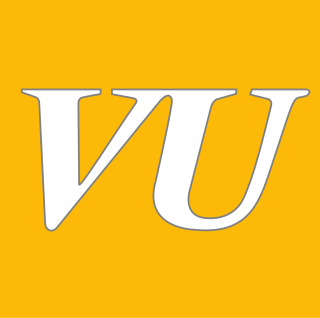
People's Union was a Flemish nationalist political party in Belgium, formed in 1954 as a successor to the Christian Flemish People's Union.

The Rexist Party, or simply Rex, was a far-right Catholic, nationalist, authoritarian and corporatist political party active in Belgium from 1935 until 1945. The party was founded by a journalist, Léon Degrelle, and, unlike other fascist parties in the Belgium of the time, advocated Belgian unitarism and royalism. Initially, the party ran in both Flanders and Wallonia, but it never achieved much success outside Wallonia and Brussels. Its name was derived from the Roman Catholic journal and publishing company Christus Rex.

The Flemish Movement is an umbrella term which encompasses various political groups in the Belgian region of Flanders and, less commonly, in French Flanders. Ideologically, it encompasses groups which have sought to promote Flemish culture and the Dutch language as well as those seeking greater political autonomy for Flanders within Belgium. It also encompassed nationalists who seek the secession of Flanders from Belgium, either through outright independence or unification with the Netherlands.
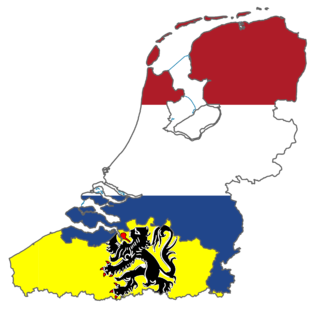
Greater Netherlands is an irredentist concept which unites the Netherlands, Flanders, and sometimes Brussels. Additionally, a Greater Netherlands state may include the annexation of the French Westhoek, Suriname, formerly Dutch-speaking areas of Germany and France, or even the ethnically Dutch and/or Afrikaans-speaking parts of South Africa, though such variants are mostly limited to far-right groups. A related proposal is the Pan-Netherlands concept, which includes Wallonia and potentially also Luxembourg.

The Vlaamsch Nationaal Verbond, widely known by its acronym VNV, was a Flemish nationalist political party active in Belgium between 1933 and 1945. It became the leading force of political collaboration in Flanders during the German occupation of Belgium in World War II. Authoritarian by inclination, the party advocated the creation of a "Greater Netherlands" (Dietsland) combining Flanders and the Netherlands.

The Flemish Legion was a collaborationist military formation recruited among Dutch-speaking volunteers from German-occupied Belgium, notably from Flanders, during World War II. It was formed in the aftermath of the German invasion of the Soviet Union and fought on the Eastern Front in the Waffen SS alongside similar formations from other parts of German-occupied Western Europe.

Verdinaso, sometimes rendered as Dinaso, was a small fascist political movement active in Belgium and, to a lesser extent, the Netherlands between 1931 and 1941.
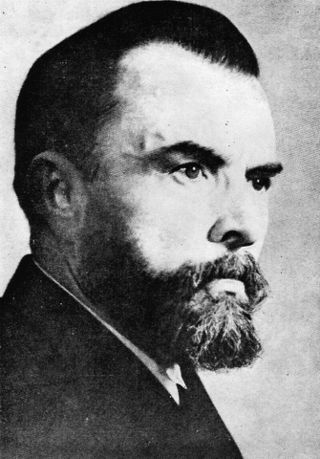
Staf De Clercq was a Flemish nationalist collaborator, co-founder and leader of the Flemish nationalist Vlaamsch Nationaal Verbond.
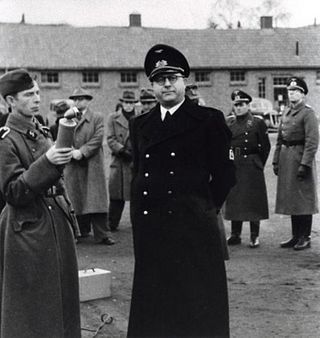
Hendrik Jozef Elias was a Belgian politician and Flemish nationalist, notable as the leader of the Vlaams Nationaal Verbond between 1942 and 1944.

Joris Van Severen was a Belgian politician and ideologue of the Flemish Movement as well as a Pan-Netherlander. A leading figure of pre-World War II Flemish nationalism, he co-founded the extreme-right group Verdinaso.
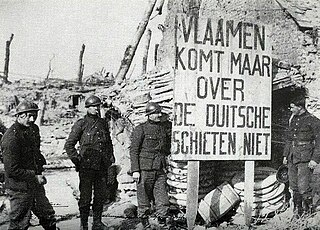
Flamenpolitik is the name for certain policies pursued by German authorities occupying Belgium during World War I and World War II. The ultimate goal of these policies was the dissolution of Belgium into separate Walloon and Flemish components.
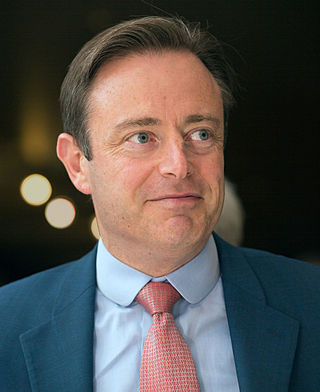
Bart Albert Liliane De Wever is a Belgian politician. Since 2004, De Wever has been the leader of the New Flemish Alliance (N-VA), a political party advocating for the independence of Flanders. He is also a member of the Chamber of Representatives. De Wever played a prominent role in the 2007 Belgian government formation and presided over his party's victory in the 2010 federal elections when N-VA became the largest party in both Flanders and in Belgium as a whole.

Cornelius Eduardus Hermans was a Belgian Flemish nationalist politician and writer.
Josephus Alphonsus Marie François was a Belgian Flemish far right politician and Nazi collaborator.

The Duitsch-Vlaamsche Arbeidsgemeenschap, better known as DeVlag, was a small radical pro-Nazi organization active in Flanders during the German occupation of Belgium. It was founded in 1936 by academics Jef Van de Wiele and Rolf Wilkening as a cultural association to strengthen the exchange of students and professors between the universities of Leuven and Cologne.

August Borms was a Flemish nationalist politician active in Belgium during the first half of the twentieth century. He belonged to the far-right of the Flemish movement. Borms collaborated with Germany during both the First and Second World Wars and was sentenced to death at the end of each conflict. He was not however executed until 1946, having had his sentence quashed the first time.

The Abbeville massacre took place during World War II on 20 May 1940 in the city of Abbeville, France.
References
- ↑ Stanley G. Payne, A History of Fascism 1914-1945, London, Routledge, 2001, p. 300
- ↑ F.L. Carsten, The Rise of Fascism, London: Methuen & Co, 1974, pp. 205-6
- 1 2 3 4 5 6 7 Carsten, The Rise of Fascism, p. 207
- 1 2 John T. Ishiyama & Marijke Breuning, Ethnopolitics in the New Europe, Lynne Rienner Publishers, 1998, p. 112
- ↑ Carsten, The Rise of Fascism, pp. 207-8
- 1 2 3 4 Carsten, The Rise of Fascism, p. 208
- ↑ Tom Buchanan & Martin Conway, Political Catholicism in Europe, 1918-1965, Oxford University Press, 1996, p. 198
- ↑ Carsten, The Rise of Fascism, p. 208-9
- ↑ Ishiyama & Breuning, Ethnopolitics in the New Europe, pp. 112-3
- ↑ Giovanni Capoccia, Defending Democracy: Reactions to Extremism in Interwar Europe, JHU Press, 2005, p.40